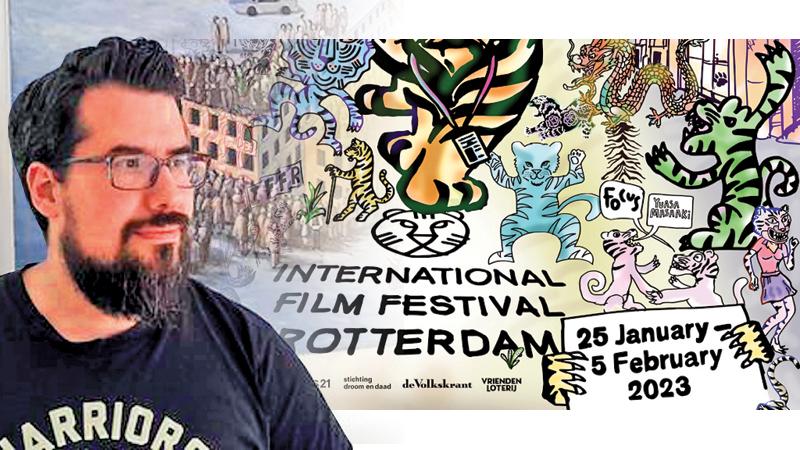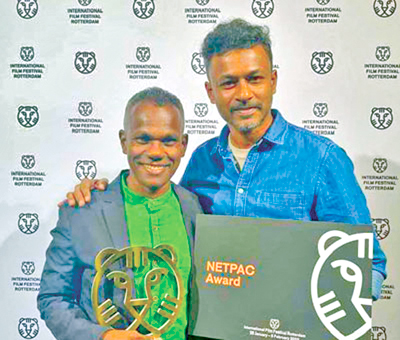
Stefan Borsos is a writer, curator, film/TV scholar, and Sinologist. In 2000, he founded the ConeAsia film magazine and began programming with the first edition of the Cineasia Film Festival Cologne in 2001, where he was primarily responsible for selecting Hong Kong, Singapore, and South Korean films. In 2004, he coordinated the German section of Europe’s inaugural ‘Hong Kong Film Panorama’. Subsequently, his festival work has focused on advising various film festivals on mainly Hong Kong/Chinese and later, South Asian films. He played a crucial role in organising the IFFR showcase on recent Tamil Cinema, ‘House on Fire’, in 2018. Since 2020, he has been the programmer for South Asia and, 2022, for Southeast Asia at the International Film Festival of Rotterdam.
The Rotterdam International Film Festival (IFFR) is one of the largest and most prestigious film festivals in the world, held annually in the Netherlands. The festival has a strong focus on showcasing innovative and cutting-edge cinema from around the globe, with a particular emphasis on emerging talent and new voices.
In recent years, the Rotterdam IFFR has also become a major platform for South East Asian cinema. The festival has been instrumental in promoting and supporting the region’s film industry, showcasing a wide range of films and filmmakers from countries such as Indonesia, Thailand, Malaysia, and the Philippines.
Through its various programs and initiatives, including the “Bright Future” and “Voices” sections, Rotterdam IFFR has helped to bring South East Asian cinema to a wider global audience. The festival has also provided opportunities for emerging filmmakers from the region to connect with industry professionals and gain greater exposure for their work.
Sri Lanka’s film industry is relatively small, producing around dozens of films annually, compared to other countries in the region. Due to the Covid-19 pandemic and economic recession, the industry has recorded a significant decline in recent years.Although Sri Lankan filmmakers have not consistently received recognition in international film festivals, their cinematic expressions have been acknowledged from time to time. Recently, two feature films, Munnel by Visakesa Chandrasekaram and Whispering Mountains by Jagath Manuwarna, were awarded at the Rotterdam International Film Festival 2023.
Similar to previous times, this recognition too has sparked a conversation about the potential for Sri Lankan cinema to gain more visibility in international film festivals. However, could the success of Sri Lankan cinema in winning international awards be attributed to more than just coincidence?
In light of this, the Sunday Observer conducted an exclusive e-interview with Stefan Borsos, the Film Programmer for South East Asia at the IFFR 2023.
In this exclusive interview Stefan explained the IFFR’s rigorous approach to showcasing cinema from Southeast Asia which is still not well-represented in the international film festival arena and the expectations and criteria of the selection and the unique cinematic qualities of the two Sri Lankan films, ‘Munnel’ and ‘Whispering Mountains,’ that were selected and awarded at the IFFR 2023.
Excerpts:
Q: How do European film festivals, particularly, the Rotterdam film festival, perceive and represent cinema in Southeast Asia?
 Visakesa Chandrasekaram and Jagath Manuwarna at the IFFR 2023 award ceremony |
A: South Asian Cinema can be categorised into three main types that are typically shown at international film festivals. The first group is socio-realist works, which is the largest group. The second is Hindi-language mainstream cinema, which is commonly shown at festivals such as Toronto and Berlin. The third and the most recent type is South Indian mainstream cinema, which has gained popularity thanks to the success of RRR. Despite this, South Asian Cinema remains underrepresented in international film festivals.
As for the International Film Festival Rotterdam (IFFR), the program aims to showcase the diversity of the entire region, rather than focusing solely on India. This means including various types of movies that cover a broad range of cinematic expressions, featuring films from both established filmmakers and newcomers.
Ultimately, the quality of each film is what matters, and there may be years where a country is represented by two films that win awards, while other years there may not be any films from that country showcased.
Q: What are the fundamental criteria that you look for when selecting films from Southeast Asian cinema, particularly, those from Sri Lanka?
A: Regardless of whether a film is from South Asia, Southeast Asia, or any other part of the world, my personal reaction to it remains the same. The factors that resonate with me in a film can vary greatly from one instance to another, and I don’t have a fixed set of standards or expectations.
Q: How would you compare the cinematic style and themes of Sri Lankan cinema with those of other Southeast Asian countries, such as Thailand, the Philippines, and Indonesia, which have more visibility in the international film festival arena compared to Sri Lanka?
A:I don’t like to make comparisons, but I think that these other Southeast Asian countries have more diversity, especially in terms of popular genre cinema. However, it’s possible that my knowledge of Sri Lankan cinema is limited and incomplete.
Q: What are the strengths and weaknesses you see in Sri Lankan films and what do you think makes Sri Lankan cinema unique or distinct from other South East Asian countries?
A:I’m not confident in my ability to provide a comprehensive comment on this issue.
Q: Upon careful review of the well-received Sri Lankan films in European film festivals, one can observe that our cinema has been approached from an anthropological perspective, and issue-based, identity politics have taken the forefront over cinema aesthetics and language. Consequently, an activism-based cinema trend/formula has emerged among young filmmakers seeking entry into the international film festival arena. Have you aware of this trend and are you promoting this or how do you interpret it?
A: I’m not entirely certain if it’s as straightforward as prioritising themes and issues over aesthetics in cinema. However, it is true that certain regions or countries have certain functions and roles in film festivals which can sometimes lead to exoticism.
The civil war in Sri Lanka may serve such a function, but films should still reflect the society they come from and engage with socio-political subjects. That being said, films should not do this solely for the sake of international attention from festivals. Personally, I welcome films from South and Southeast Asia, regardless of their genre or style. Therefore, in regards to this year’s lineup of Sri Lankan Cinema, it just happens to be a coincidence that both films are highly political.
Q: What are the unique cinematic qualities or specialties that you observed when selecting ‘Munnel’ by Visakesa Chandrasekaram for the Tiger Awards and ‘Whispering Mountains’ by Jagath Manuwarna Kodithuwakku for the Bright Future category at the Rotterdam Festival?
A:Regarding Whispering Mountains, I was particularly drawn to its use of long takes (which I have a soft spot for, regardless of the film’s country of origin), as well as its dark sense of humour. Munnel, on the other hand, captivated me with its understated visual style, yet powerful and direct themes, which was an intriguing and unique combination. Both films managed to resonate with me in distinct yet powerful ways.
Q: How have the recent economic crisis and political upheaval in Sri Lanka influenced your selection of films from the country?
A:No, not at all. Although I was aware of the political situation in the country, I wasn’t specifically seeking out political films, and I typically don’t pay too much attention to promotional materials before watching a film. Therefore, my knowledge of both Munnel and Whispering Mountains was quite limited before viewing them. Ultimately, my assessment of the films is based purely on their cinematic merits.
Q: What do you think are the prospects for Sri Lankan cinema in the global film market?
A: Similar to the state of South Asian Cinema in general, the likelihood of having a successful and prolonged festival run, securing a suitable sales agent, and eventually achieving international distribution is quite low at present. The reality is that South Asian Cinema is not currently in high demand globally, making it exceedingly challenging to achieve a breakthrough. Simply being selected for a festival or even receiving an award is not enough, as the hardest work comes after the film’s world premiere.
Q: How do you think Sri Lankan cinema could be better promoted or showcased to international audiences?
A:The most crucial aspect is to overcome the current lack of recognition from film festivals, critics, sales agents, and distributors. To address this, IFFR is putting extra efforts to sustain the visibility and attention of not only South Asian but also Southeast and East Asian Cinema at the festival.
On the other hand, filmmakers must also make an extra effort to become a part of the global film economy, which requires networking, participating in film markets, labs, and more. Filmmakers from East and Southeast Asia seem to excel in this aspect. Ultimately, it’s about understanding how to play the game and utilising certain structures to their advantage.
Q: What advice would you give to Sri Lankan filmmakers who are looking to break into the international film festival scene?
A: The key point is to maintain originality and avoid the pressure to conform to certain expectations or templates set by programmers, mentors, or international co-producers. It’s important to be aware of potentially problematic influences, such as suggestions to model your film after national cinemas like Iran or South Korea. Stick to your vision and make the film that reflects your unique voice and perspective.

Winners at the IFFR 2023
